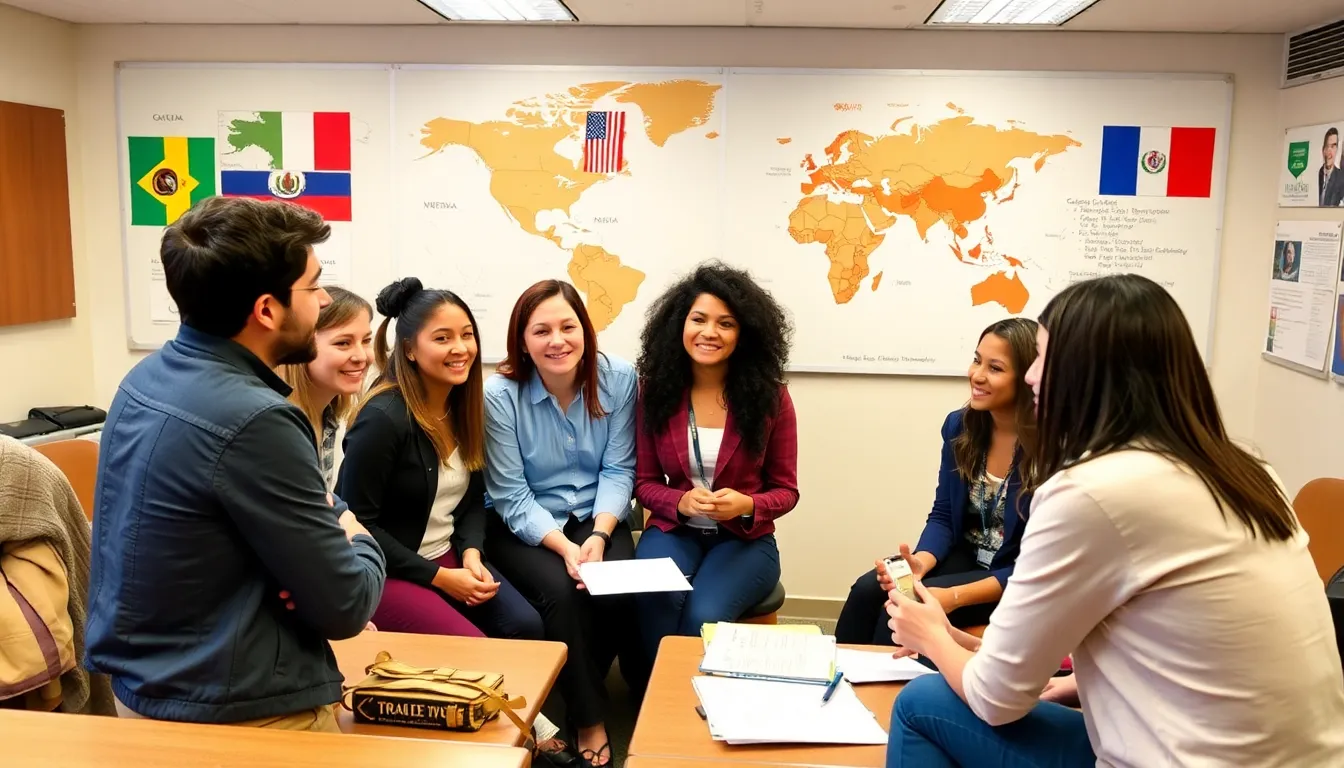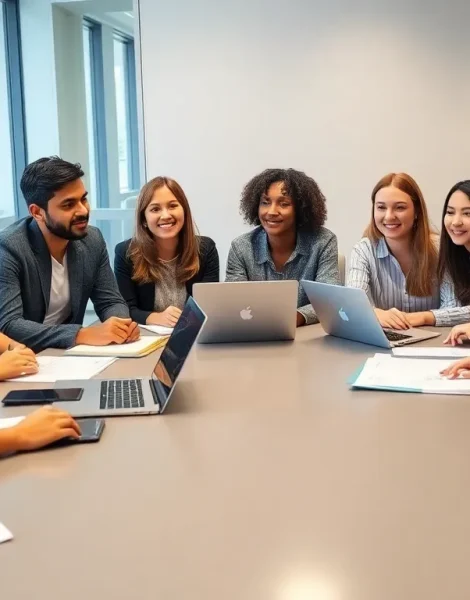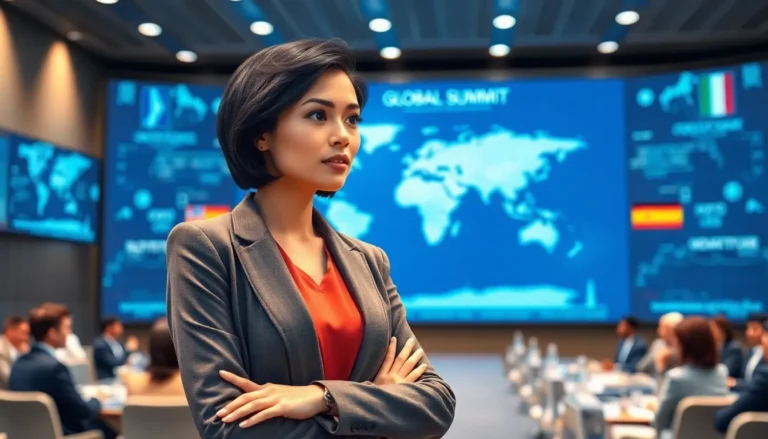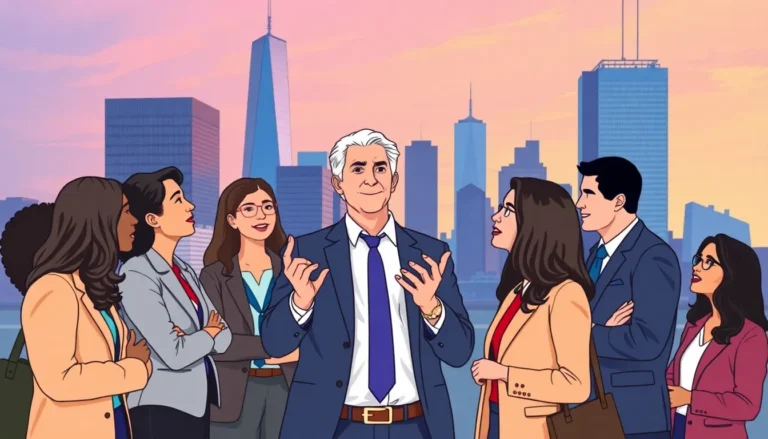In a world where global dynamics shift faster than a cat meme goes viral, understanding international relations is more crucial than ever. George Mason University’s Global Affairs program offers students a front-row seat to the intricate dance of diplomacy, economics, and culture that shapes our planet. It’s not just about reading textbooks; it’s about diving headfirst into the complexities of global issues while avoiding the awkwardness of small talk at parties.
Table of Contents
ToggleOverview of Global Affairs GMU
George Mason University offers a comprehensive Global Affairs program designed to equip students with essential skills for navigating the complexities of international relations. The curriculum focuses on key areas such as diplomacy, economic policy, and cultural dynamics. Through a blend of theoretical knowledge and practical experiences, students engage directly with pressing global issues.
The program emphasizes hands-on learning experiences, allowing students to apply their knowledge in real-world contexts. Various projects and internships offer opportunities to work with government agencies, non-profits, and international organizations. Students often participate in simulations and case studies that mirror actual diplomatic negotiations.
A diverse faculty, composed of experienced practitioners and renowned scholars, guides students throughout their journey. Each instructor brings unique insights into their field, enhancing the overall learning environment. The faculty’s expertise ensures that students receive current, relevant information regarding international affairs and global trends.
Networking opportunities abound within the program. Students meet professionals who share their expertise and career paths. Events, speaker series, and workshops connect students to influential figures in international relations, fostering valuable relationships for future career prospects.
The program also emphasizes cultural understanding and awareness. Courses on global cultures and languages allow students to appreciate various perspectives. This aspect cultivates a mindset adaptable to diverse environments and enhances communication skills across cultural barriers.
Overall, George Mason University’s Global Affairs program shapes well-rounded graduates prepared for careers in various fields, including diplomacy, international business, and humanitarian work. The focus on practical engagement alongside academic rigor positions students to succeed in an interconnected world.
Program Structure

George Mason University’s Global Affairs program features a well-organized structure that supports comprehensive learning. This structure involves core and elective courses designed to provide students with a robust educational foundation.
Core Courses
Core courses form the backbone of the Global Affairs program. Students engage with subjects like international relations, global economic systems, and diplomatic history. Each course emphasizes critical thinking and analytical skills, preparing students to tackle real-world challenges. Faculty with extensive experience in international affairs lead discussions, offering practical insights. Simulations often accompany these courses, allowing students to practice negotiation and conflict resolution techniques in realistic settings.
Elective Courses
Elective courses expand knowledge beyond core requirements. Students select from a range of topics, including human rights, environmental policy, and international development. These courses allow for specialization based on individual career goals and interests. Networking opportunities frequently arise during elective courses, connecting students with experts in their fields. Through diverse perspectives, students gain a deeper understanding of global complexities, enhancing their adaptability in various professional environments.
Faculty and Research Opportunities
George Mason University’s Global Affairs program boasts a diverse faculty comprised of experienced practitioners and renowned scholars. The faculty members bring valuable insights into current international affairs, enhancing the learning experience for students. They engage students in critical discussions and facilitate simulations that promote practical skills in negotiation and conflict resolution.
Research opportunities abound through collaboration with faculty on projects that address pressing global challenges. Students often work alongside faculty on research initiatives, gaining hands-on experience while contributing to meaningful studies. Faculty actively pursue research that informs policy and practice, allowing students to be part of impactful work.
Events like workshops and speaker series regularly feature experts from the field, creating further networking opportunities. Speakers often include diplomats, analysts, and representatives from international organizations. Such interactions not only enrich the educational experience but also broaden students’ professional networks.
Internships with government agencies and NGOs present another avenue for learning. Students frequently secure internships where they apply classroom knowledge to real-world scenarios. These practical experiences reinforce the curriculum and prepare graduates for successful careers in various sectors.
Courses emphasize specialized areas such as human rights, environmental policy, and international development. They offer in-depth knowledge while allowing students to tailor their studies according to their interests. Elective options empower students to focus on specific topics, enhancing both their expertise and employability.
Through these faculty-driven research opportunities and experiential learning components, George Mason University’s Global Affairs program equips students with the robust skill set necessary for thriving in a complex global landscape.
Student Organizations and Activities
George Mason University’s Global Affairs program features numerous student organizations that enhance academic and professional development. These organizations focus on international relations, diplomacy, and cultural exchange, providing students opportunities to engage with peers passionate about global issues.
Model United Nations offers students a platform to simulate UN proceedings, sharpening negotiation and public speaking skills. Participation in this organization cultivates a deeper understanding of diplomatic processes and international policymaking.
The International Relations Club encourages students to discuss current global events, fostering critical thinking and diverse perspectives. Activities include guest lectures, debates, and film screenings, enriching students’ understanding of international affairs.
Another engaging option is the Global Education Office. This office assists students in exploring study abroad programs, internships, and volunteer opportunities in various countries. Through these experiences, students gain firsthand knowledge of different cultures and international systems.
Networking events organized by the program often feature industry professionals, including diplomats and policy analysts. These events provide insights into career paths and help students build relationships that can lead to internships and job opportunities.
Cultural exchange programs promote understanding and awareness of global cultures, allowing students to share their knowledge while learning from others. Activities such as language exchange and cultural festivals enrich the campus community and encourage inclusivity.
Involvement in these organizations and activities equips students with practical skills and enhances their resumes. Engaging with peers and professionals prepares graduates to tackle global challenges effectively and thrive in an interconnected world.
Career Prospects for Graduates
Graduates from George Mason University’s Global Affairs program find numerous career opportunities in various fields. Many enter government positions, leveraging skills gained through internships and simulations. International organizations also seek graduates adept at navigating complex global issues.
Nonprofits value the analytical and practical expertise that these graduates possess. Roles in human rights advocacy, environmental policy, and international development become accessible through targeted elective courses. Companies involved in global trade and diplomacy often recruit graduates who understand economic systems and cultural dynamics.
Networking events and workshops provide direct connections to industry professionals. Alumni from the program frequently assist new graduates by sharing insights and job leads. Additionally, participation in student organizations like Model United Nations offers valuable experience in negotiation and teamwork.
Research collaborations with faculty members open pathways to careers in academia and think tanks. In some instances, graduates secure positions as analysts or consultants, contributing to policy development. Professional internships also play a crucial role in enhancing employability by offering real-world experience.
Cultural exchange programs further enrich the educational experience, allowing graduates to work effectively in diverse environments. Graduates often find roles in diplomacy or international relations, equipped with the communication skills required for success. The program’s emphasis on practical engagement ensures that alumni stand out in a competitive job market.
George Mason University’s Global Affairs program stands out as a vital resource for students eager to navigate the complexities of international relations. By combining theoretical knowledge with practical experiences and extensive networking opportunities, it prepares graduates for successful careers across various fields. The program’s focus on cultural understanding and hands-on learning equips students with the skills necessary to thrive in an interconnected world. As global challenges continue to evolve, the insights and experiences gained through this program will undoubtedly empower its graduates to make meaningful contributions on the international stage.









